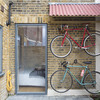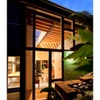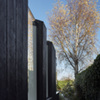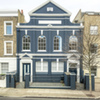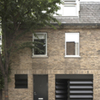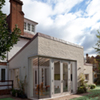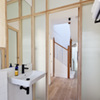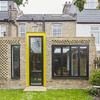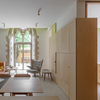The Biscuit Factory
Subscribe now to instantly view this image
Subscribe to the Architects’ Journal (AJ) for instant access to the AJ Buildings Library, an online database of nearly 2,000 exemplar buildings in photographs, plans, elevations and details.
Already a subscriber? Sign in
suprblk_biscuitfactory_01
Nicholas Worley Download Original
A refurb in east London.
The Biscuit Factory is a refurbishment that aimed to revive the architectural characteristics of the original baking room of an old biscuit factory in east London, which had been masked in a dark and dated 1980’s conversion.
The project uses inhabitable ‘pods’ to divide the rooms rather than conventional walls and sought to challenge the standard formula of London living by emphasising space, natural light penetration, volume and flexibility.
The pods, set back from the south-facing windows and newly revealed glazed brick columns, behave as large pieces of furniture within the space. Instead of thinking in plan, the project sought to utilise the verticality of the 3.5m high ceilings in an inventive and playful way. A bright yellow captain's ladder staircase doubles up as stationary storage for a new mezzanine office, while the compression of an intimate bathroom enables the creation of a reduced height guest accommodation.
These carefully designed spatial relationships transformed the floor area from 60sqm to 77sqm, turning this awkward studio into a work-live home with two bedrooms, walk-in closet, bathroom, integrated kitchen and living area, office, guest area and over 6sqm of storage.
Constructed from birch plywood, the pods were carefully treated with a light grey semi-translucent stain, transforming them into something unique. Simple cost-effective details create a deliberately minimal and functional aesthetic such as track lighting made of industrial unistrut and oversized rainwater gutters for vertical risers.
The colours, historic scars and rippled reflections of the uncovered glazed brick columns tell a wonderful story: something simple looked at in an inventive way can be transformed into something truly beautiful. This was the design ethos of the flat: embrace awkward junctions, maximise natural light and utilise materials to their full potential by crafting them carefully to accomplish a lot with a little.
Data
- Begun: May 2017
- Completed: Mar 2018
- Floor area: 77m2
- Sector: Residential
- Total cost: £85,000
- Funding: Privately funded
- Tender date: Mar 2017
- Procurement: Traditional
- CO2 Emissions: 1.59kg/m2/year
- Address: 110 City View House, 463 Bethnal Green Road, London, E2 9QY, United Kingdom
Professional Team 
- Architect: SUPRBLK
- Client: Sara L'Esperance & Michael Putman
- Main contractor: Property DMR
- Selected subcontractor and suppliers: Kitchen: Ikea carcass with custom stained birch- veneered plywood cabinet fronts Joinery: Grey stained Russian birch-veneered plywood Timber floor: Domus Group Marsden Meach Parquet Bathroom tiles: Domus Group Seta Danse 01 & Danse 13 Lighting: Insidestor













